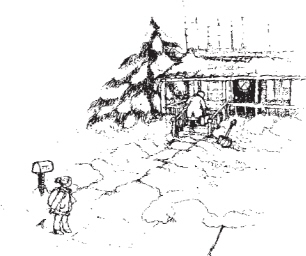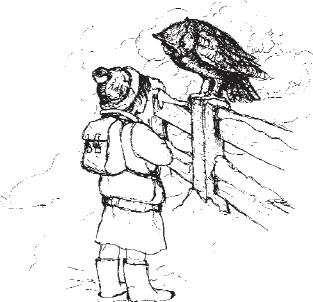Sara, Book 1 (13 page)

Sara tried to stifle an ear-to-ear grin as she read the words written in bright red ink. Mr. Jorgensen glanced back at Sara as he handed the girl in front of her her paper, and when Sara’s eyes met his, he winked at her.
Sara felt her heart jump. She felt very proud. This was a new feeling for Sara, and one, she noticed, that she liked very much.
Sara couldn’t wait to get to the thicket to talk to Solomon.
“Solomon, what has happened to Mr. Jorgensen?” Sara asked. “He seems like a different man.”
He’s the same man, Sara; you’re just noticing different things.
“I don’t think I’m noticing different things; I think he’s doing different things.”
Like what, Sara?
“Well, like he smiles a lot more than he used to. And sometimes he whistles before the bell rings. He never used to do that. He even winked at me! And he’s been telling better stories in class, making the class laugh more. Solomon, he just seems a whole lot happier than he used to.”
Well, Sara. It sounds like your teacher may have joined your chain-of-joy.
Sara was stunned. Was Solomon actually trying to give Sara the credit for Mr. Jorgensen’s change in behavior?
“Solomon, are you saying that I made Mr. Jorgensen happier?”
Well, it’s not only your doing, Sara, because Mr. Jorgensen truly wants to be happy. But you did help him to remember that he wants to be happy. And you did help him to remember why he decided to become a teacher to begin with.
“But Solomon, I haven’t talked to Mr. Jorgensen about any of that. How could I have helped him to remember that?”
You did all of that, Sara, with your appreciation of Mr. Jorgensen. You see, anytime you hold someone, or something, as your object of attention, and at the same time, you’re feeling that wonderful
feeling of appreciation—you add to their state of Well-being. You shower them with your appreciation.
“Like spraying them with the garden hose?” Sara giggled, pleased with her own silly analogy.
Yes, Sara. it’s very much like that. But before you can actually spray them, you have to hook your hose to the faucet and turn it on. And that is what the appreciation does. Whenever you’re feeling appreciation or love, whenever you’re seeing something positive about someone or something, you’re hooked to the faucet.
“Who puts the appreciation in the faucet, Solomon? Where does it come from?”
It has always been there, Sara. It’s just naturally there.
“Well, then, why aren’t more people spraying it around?”
Well, because most people have disconnected from the faucet, Sara. Not intentionally, but they just don’t understand how to stay connected.
“Okay, then, Solomon, are you saying that I can hook up to it anytime that I want to and I can spray it around, anyplace, anytime, on anything I want to?”
That’s right, Sara. And wherever you spray your hose of appreciation, you will begin to notice very obvious changes.
“Wow!” Sara whispered, mentally trying to size up the magnitude of what she had just learned. “Solomon, this is like magic!”
It seems like magic at first, Sara, but in time it begins to feel very natural. Feeling good—and then being a catalyst to help others feel good—is the most natural thing you will ever do!
Sara gathered her book bag and her discarded jacket, getting ready to tell Solomon good-bye for this day.
Just remember, Sara, your work is to stay hooked to the faucet.
Sara stopped and turned back to Solomon, realizing, suddenly, that this may not be as easy or as magical as Solomon had made it sound at first.
“Is there a trick to that, Solomon, to stay hooked to the faucet?”
It may take a little practice at first. You’ll get better and better at it. For the next few days, just think about something, and then pay attention to how you feel. You’ll notice, Sara, that when you’re appreciating or basking or applauding or seeing positive aspects, you’ll feel wonderful, and that means you’re hooked to the faucet. But when you’re blaming or criticizing or finding fault, you won’t feel good. And that means you’re unhooked, at least for the time you’re feeling bad. Have fun with this, Sara.
And with those last words, Solomon was gone.
Sara felt such exhilaration as she walked home that day. She had already enjoyed Solomon’s game of appreciation, but the idea of appreciating with the intent of hooking to this wonderful faucet excited her even more. Somehow it gave Sara more reason to appreciate.
Sara rounded the corner for the last stretch of her walk home and saw Old Aunt Zoie moving very slowly up her walkway. All winter long, Sara hadn’t seen her at all, and she was surprised to see her outside. Aunt Zoie didn’t see Sara, so Sara didn’t call out to her, not wanting to startle her, and also, not wanting to get involved in the long conversation that was probable. Aunt Zoie talked very slowly, and over the years, Sara had learned to avoid the frustration of seeing her groping for words to express her thoughts. It was as if her mind worked so much faster than her mouth that she would get all mixed up about where she was within the thought. When Sara tried to help by putting a word in here and there, it only irritated Aunt Zoie. So Sara had decided that avoidance was the best solution
—
although that never really felt right either. Sara felt sad as she watched this poor old woman hobbling up her stairs. She was holding on to the railing with all of her strength, taking one step at a time, very slowly moving up a set of four or five stairs onto her front porch.

I hope I’m not like that when I’m old,
Sara thought. And then Sara remembered her last talk with Solomon.
The faucet! I’ll shower her with the faucet! First, I connect to the faucet, and then I flow it all over her.
But the feeling wasn’t there.
Okay, I’ll try again.
Still, no feeling of being hooked up. Sara felt instant frustration. “But Solomon,” she pleaded, “this is really important. Aunt Zoie needs to be sprayed.” No reply from Solomon. “Solomon, where are you?” Sara shouted out loud, not even realizing Aunt Zoie had now noticed her and was standing at the top of the stairs watching her.
“Who are you talking to?” Aunt Zoie barked.
Sara was startled and embarrassed. “Oh, nobody,” she replied. And she scampered quickly down the path, past Aunt Zoie’s garden, now just a muddy field waiting for the new spring planting. Red-faced and angry, Sara went home.


“S
olomon, where were you yesterday?” Sara whined, as she encountered Solomon on his post. “I needed you to help me hook to the faucet so that I could help Aunt Zoie feel better.”
Do you understand why you were having trouble hooking up, Sara?
“No, Solomon. Why couldn’t I hook up? I really wanted to.”
Why?
“I really wanted to help Aunt Zoie. She is so old and confused. Her life just can’t be much fun.”
And so you wanted to hook to the flow, to shower Aunt Zoie, to fix what is wrong with her, so that she can be happy?
“Yes, Solomon. Will you help me?”
Well, Sara, I would like to help you, but I’m afraid that it’s not possible.
“Why not, Solomon? What do you mean? She is really the nicest old lady. You’d like her, I think. I’m sure she has never done anything wrong . . .”
Sara, I’m sure you’re right. Aunt Zoie is a wonderful woman. The reason we can’t help her, under these circumstances, has nothing to do with her; it’s you, Sara.
“Me?! What did I do, Solomon? I’m just trying to help her!”
Yes, indeed, Sara. That is what you’re wanting. It’s just that you’re going about it in a way that cannot work. Remember, Sara, your work is to connect to the faucet.
“I know that, Solomon. That’s why I needed you. To help me hook up.”
But you see, Sara, I can’t help you either.
You
have to find that feeling place.
“Solomon, I don’t get it.”
Remember, Sara, you cannot be part of the chain-of-pain and hooked to the faucet of Well-being at the same time. It’s one or the other. When you’re observing an unwanted condition that causes you to feel bad, that bad feeling is how you know you’re unhooked. And when you’re not connected to the natural flow of Well-being, you have nothing to give to another.
“Good grief, Solomon, it seems impossible. If I see someone who needs help, just seeing them needing help makes me vibrate in a way that I can’t help them. That’s just awful. How can I ever help anybody?”
You have to remember that the most important thing is to stay connected to the faucet of Well-being so you must hold your thoughts in a position that keeps you feeling good. In other words, Sara, you have to be more aware of your connection to the faucet of Well-being than you’re aware of the conditions. That’s the key.
Sara, think back about what happened yesterday. Tell me what happened with Aunt Zoie.
“Okay. I was walking home from school, and I saw Aunt Zoie hobbling up her front sidewalk. She’s all crippled, Solomon. She can hardly walk at all. She has this old cane made out of real old wood that she uses to hold herself up.”
And then what happened?
“Well, nothing really happened. I was just thinking how sad it is that she is so crippled . . .”
And then what happened?
“Well, nothing happened, Solomon . . .”
How were you feeling about then, Sara?
“Well, Solomon, I felt real bad. I felt really sorry for Aunt Zoie. She could hardly pull herself up the steps. And then I felt scared that I might be like that when I get old, too.”
Now that is the most important point in this whole thing, Sara. When you notice that you’re feeling bad, that’s how you know that you’re looking at a condition that disconnects you from the faucet. You see, Sara, in truth, you’re naturally hooked to the faucet. You don’t have to work to get hooked to it. But it’s important to pay attention to how you’re feeling so you know when you’re
unhooked
. That’s what negative emotion is.
“But what should I have done to stay hooked up, Solomon?”
I have noticed, Sara, that when it’s your top priority to stay hooked, you find more and more thoughts that keep you hooked up. But until you truly understand that that is what is most important, most of you will go off on all kinds of wild-goose chases.
I will offer you a series of thoughts, or statements, and as you hear them, pay attention to the way you feel. Does the statement hook you up to the faucet or disconnect you from it?
“Okay.”
Look at that poor old woman. She can barely walk.
“Well, that feels bad, Solomon.”
I just don’t know what will happen to Aunt Zoie. She can barely get up the stairs now. What will she do when she gets worse?

